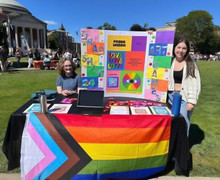Doctoral candidate responds to Theta Tau videos
Recent events have rightfully shocked our campus. Many mistakenly thought that such displays of hateful language and childish behavior were relegated to the past, but we should know better. We’ve seen such videos before. Students occupied the lobby of Crouse-Hinds Hall only a few years ago to demand action on racial injustice, sexual violence and diversity issues on campus, among other issues. The university has done an admirable job in taking steps toward meeting those demands, but it’s clear that current efforts are not enough. The university’s climate assessment survey rosily reported “high levels of comfort with the climate at Syracuse University,” even as the same executive summary noted that “20% of respondents indicated that they personally had experienced exclusionary, intimidating, offensive, and/or hostile conduct.” How do we reconcile the idea our campus climate is comfortable and welcoming with the reality that at least one in five members of our campus community experience some form of discriminatory conduct?
For those who learn, work, play and live at the university, the stakes of facing discrimination are high. It’s incumbent on the university to do everything in its power to combat discrimination in its every ugly manifestation. The chancellor’s response to the latest events show that he takes this obligation seriously, but I hope that current efforts are only the beginning. As the university reviews its options, it should be sure to seek out effective policies with ample evidence proving their usefulness. For example, there is some discussion of requiring new — or better — diversity, sensitivity and anti-bias trainings. Yet there is little evidence that these trainings do any real good, and some evidence that they can backfire. Decisive action isn’t enough when the proposed solution is an ineffective Band-Aid.
The administration must build a truly inclusive campus climate. To do so, it must be deliberate and critical in its approach. It must also listen to the community. Groups like THE General Body and the Chancellor’s Work Group on Diversity and Inclusion each offered concrete solutions based on the needs of the Syracuse University community. Scholarship in Action also provides a framework and vision to draw on. As we confront the ugly reality that our campus climate is not as comfortable as reported, I hope the administration will draw on the struggles and successes of the past few years to provide a model for the future.
Sincerely,
Eric van der Vort
Doctoral Candidate, Political Science
Maxwell School of Citizenship and Public Affairs
Published on April 28, 2018 at 5:47 pm





